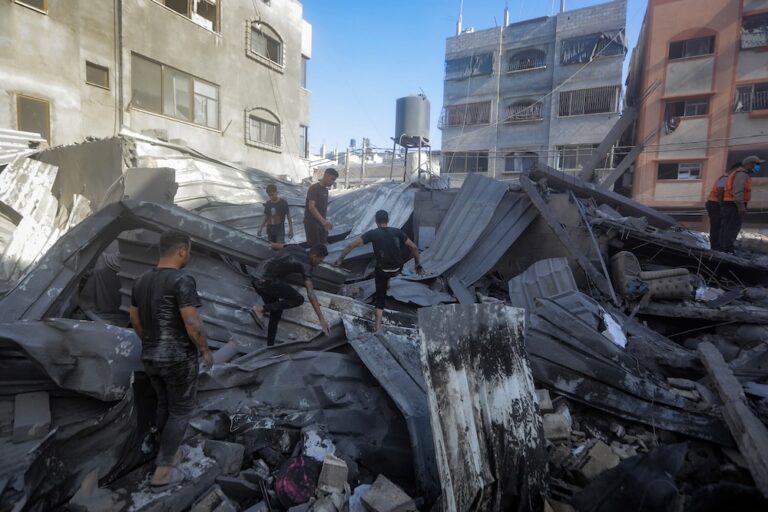(IFJ/IFEX) – The following is an IFJ media release: April 5th 2002 World Journalists Condemn Israeli “Media Targeting” After Troops Open Fire on Reporters The International Federation of Journalists today launched a new appeal for Israel to stop targeting journalists and media after Israeli soldiers opened fire on a crowd of television and press staff […]
(IFJ/IFEX) – The following is an IFJ media release:
April 5th 2002
World Journalists Condemn Israeli “Media Targeting” After Troops Open Fire on Reporters
The International Federation of Journalists today launched a new appeal for Israel to stop targeting journalists and media after Israeli soldiers opened fire on a crowd of television and press staff trying to cover the meeting between United States envoy Anthony Zinni and Palestinian leader Yasser Arafat.
“Israeli must stop targeting media people,” said Aidan White, IFJ General Secretary, after Israeli soldiers opened fire with stun grenades and rubber bullets on the crowd of more than two dozen journalists waiting outside the Ramallah compound where Yasser Arafat is under siege. “It is a miracle that someone was not seriously hurt, but tragedy is inevitable unless Israel tells its troops to stop firing on reporters.”
The IFJ says that there have already been four journalists killed and more than 50 incidents of violence and intimidation of media during the current Intifada.
The IFJ wrote to President Ariel Sharon a few days ago appealing for an end to targeting of media in the current conflict. “Israel must recognise that journalists carrying out their professional duties are non-combatants who are protected by the Geneva Conventions,” said Aidan White.
The journalists covering the Zinni visit are mainly foreign correspondents and Palestinian media staff. According to a report from CNN staff member Michael Holmes, two military jeeps pulled up and without warning threw a handful of stun grenades into the media crowd. As the journalists scattered and fled in five armoured vehicles, the soldiers fired rubber-coated bullets at the convoy.
“This incident is a horrifying example of how journalists are being victimised in this conflict,” said Aidan White, “the whole world is watching and waiting nervously for news of events on the ground, but journalists are being terrorised just for doing their job. It is completely unacceptable.”
The IFJ, the world’s largest journalists’ group, has carried out a series of solidarity actions on the ground and has launched a global campaign to highlight the problems facing media and reporters. Further Information from: www.ifj.org.
The IFJ represents more than 450,000 journalists in 100 countries.


